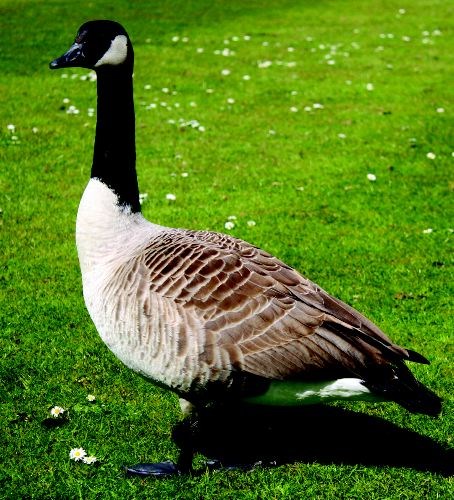When Diane Vanderwiel found a "little ball of yellow fluff" and an eagle circling above while driving along a road near Fort St. James two years ago, little did she know she'd eventually be breaking a federal law against keeping Canada Geese as a pets.
All she knew was she needed to rescue the gosling, which Vanderwiel figured was about two days old, and by the time a federal wildlife official came by on Wednesday to confiscate the bird, it had a name and had become a part of Vanderwiel's family.
"At the time she was found we had her in the house for a couple of weeks because she was pretty weak," Vanderwiel said of Lucy. "I put her in a crate and gave her oatmeal and different things.
"I didn't know she was a goose at that time. She was just a little ball of fuzz that sat in your hand."
When Lucy was big enough she was put in with the chickens Vanderwiel and her husband raise on their five-acre spread at Pinchi Lake, an hour's drive north of Fort St. James and 196 kilometres north of Prince George.
Vanderwiel said she's never clipped one of the goose's wing to keep her from flying, but Lucy became so domesticated she never joined the other Canada Geese on their fall migratory flight.
"We have geese that come and lay in the back field and I brought Lucy to them," Vanerwiel said. "When they were squawking, she would squawk back but when I went back [home] she would follow me."
Instead, Lucy spent her time keeping up with the couple's four dogs. It came to the point where Vanderwiel's suggestion to go for a walk would be met with Lucy's honking approval.
"Lucy is the baby of the family," Vanderwiel said. "She doesn't bite, she's totally friendly."
The goose was confiscated Wednesday under a section of the Migratory Birds Convention Act that prohibits the keeping of wildlife except in a facility authorized to possess migratory birds.
Lucy is now at the Northern Wildlife Rescue Society's (NWRS) sanctuary in Prince George but will be transported to a facility in Vancouver, the sanctuary's manager, Chad Bohanan said.
Vanderwiel panicked when she was told by NWRS staff that the bird would be euthanized within a week, but Bohanan said that was doubtful.
"There are options as far as integrating her into a flock. Apparently, a few rehab centres have some permanent residents down there that aren't in captivity. They're released but they just stay close to the marsh areas down there and they don't even migrate, they just stay where the climate's much easier for them."
Bohanan did add that Lucy's survival would count her as one of the lucky rescued wild animals.
"It is pretty tough when animals are habituated to humans, it's definitely not ideal for them and sometimes euthanasia ends up being the option," he said.
People who come across young wildlife that appear abandoned should leave them alone, Bohanan said, because their mothers may be nearby and were just scared into the treeline by a passing vehicle.
But if someone does take in a wild animal, Bohanan said, the next thing they should do is contact a wildlife rehabilitation centre, which has the skills to properly raise and feed the animal and introduce it back into its natural habitat.
"The goal for all rehabbers is to get the animal back into the wild eventually, so minmize human contact and give them the proper care they need and keep them only as long as they need to be kept to prevent that imprinting with humans," Bohanan said.
Keeping wildlife as pets, even geese, can be dangerous, he said.
"I'm sure you've seen some of these videos where geese are actually attacking humans, they can cause some harm, absolutely. And it causes a lot of emotional trauma and stress to the animal."



